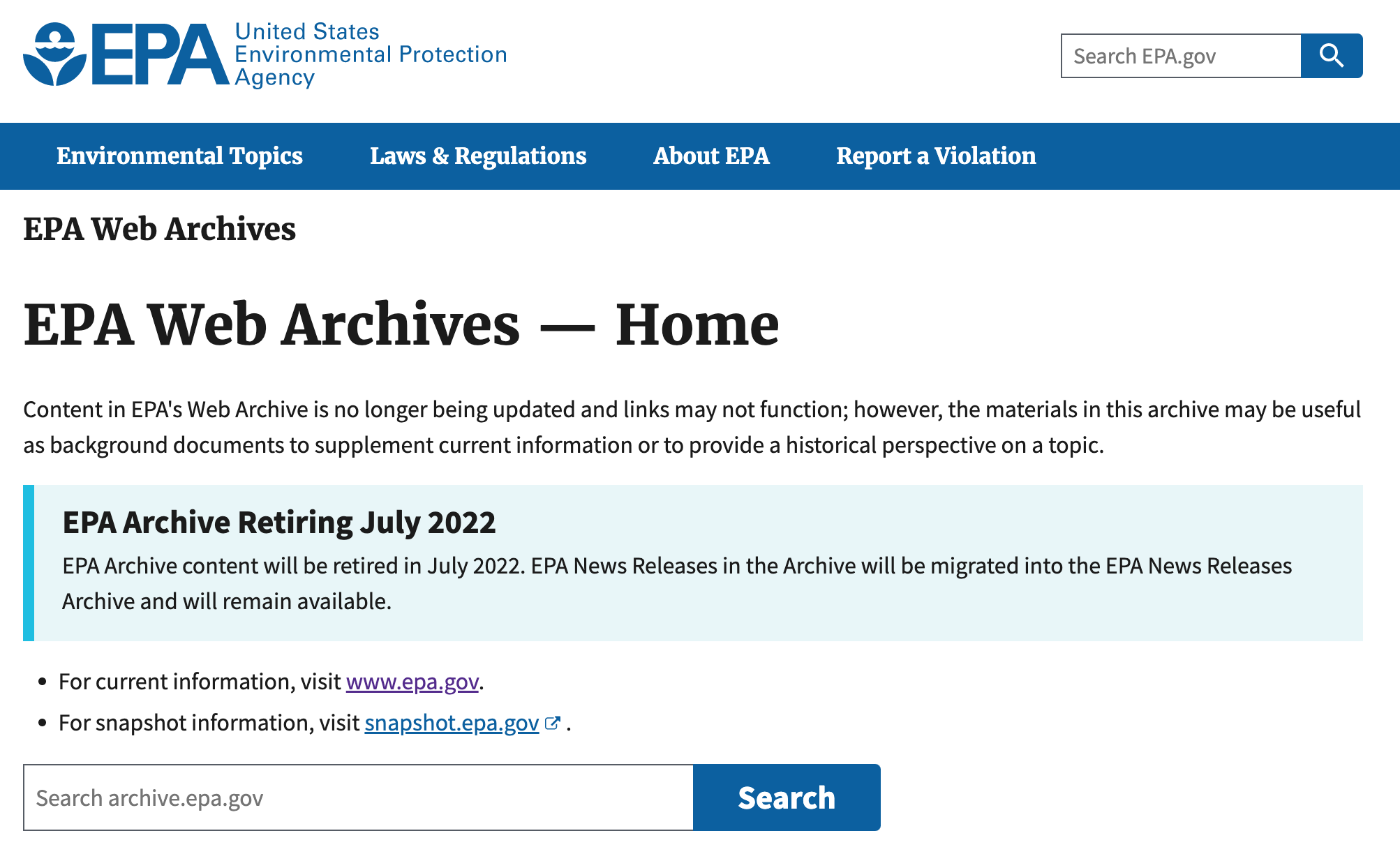The EPA plans to retire its online archive in July 2022.
Open Letter to EPA Asks Agency Not to Sunset its Online Archive
June 13, 2022 – Today, environmental and archivist groups including the Environmental Data & Governance Initiative, Sierra Club, Union of Concerned Scientists, and Free Government Information published an open letter asking the Environmental Protection Agency not to sunset its online archive, which the agency has indicated it will do in July 2022. The letter and the complete list of initial signatories can be found here. A companion letter from professional historians’ organizations, including the Environmental Historians Action Collaborative and American Society of Environmental Historians, can be found here.
The EPA’s online archive contains a public record of the agency’s positions and activities over the last 20-plus years. These resources convey information about critical environmental issues, and past and present agency activities, policies, and priorities and have facilitated public engagement and oversight of the agency. Maintaining—and improving—the archive supports the agency’s outspoken commitments to public trust, scientific integrity, and environmental justice. Retiring the archive undermines these commitments.
There are documents discoverable through the EPA’s archive that are not available anywhere else, including records of chemicals authorizations, policy decisions, and monitoring data from natural disasters. Only through the EPA archive is it possible to trace public-facing EPA climate change information over the course of the escalating crisis. The EPA’s archive served as a tool to counter some of the effects of the Trump administration’s censorship—especially of climate-related information. When the Trump administration deleted the majority of EPA’s climate change web resources, many of them became available (if challenging to access) through the archive.
In our digital age, agencies must make their documents accessible to the public. We need the EPA’s archive to be improved, not retired. Instead of doing away with the EPA archive, the Biden administration could promote it as a model for other parts of the Executive Branch.
Alejandro Paz, member of the Environmental Data & Governance Initiative and Outreach and Data Librarian for the Union of Concerned Scientists, issued the following statement:
The archive makes information available to anyone interested in understanding how the Environmental Protection Agency—the federal agency tasked with enforcing bedrock U.S. environmental laws—has operated over the years. Some of this information—on historical regulatory actions like the 2003 Clear Skies Initiative, as just one example—isn’t available anywhere else. Other information may be available elsewhere–under a paywall, through FOIA, or in the Federal Register—but the EPA archive makes these resources far more accessible. By making this information available, journalists, researchers, and the public can investigate the past, present, and future of this critical environmental agency. This kind of transparency facilitates democratic oversight and is central to a healthy functioning democracy. We need the EPA’s archive to be improved, not retired, to serve as a model for other federal agencies.
James Jacobs, US Government Information Librarian for Stanford University Libraries and co-founder of Free Government Information (FGI), issued the following statement:
In the face of the global climate crisis, the EPA’s decision to sunset and take its online archive of historical public information off the internet is extremely short-sighted, detrimental to the public, scientific community, and policy makers alike, and goes against the Biden administration’s own commitment to environmental justice. Public access to EPA—and all executive agencies’—publications remains crucial to unraveling the climate crisis which is already having a devastating impact on communities. Public information demands long-term public stewardship and preservation. EPA needs to ensure that its archive is curated within the Government Publishing Office (GPO)’s National Collection. This is more important than ever as this information is critical to inform and mobilize the government and the public toward solving the climate crisis.
Sarah Elkind, President of the American Society for Environmental History, issued the following statement:
The American Society for Environmental History promotes evidence-based research on all aspects of environmental change and the consequences of environmental change on our communities. While many scholars will be able to travel to archives or use FOIA for research, many others cannot. Community groups and students depend upon online archives for their research, and to develop critical and analytical skills. These uses of the EPA online archive support the EPA’s mission to protect human health and the environment, participate in environmental stewardship, and ensure that all of society has access to accurate information about human health and environmental risks. We urge the EPA to reconsider its decision to sunset the online archive because now is not the time to make evidence-based research more difficult.
Emily Pawley, co-coordinator of the Environmental Historians Action Collaborative and member of the Environmental Data & Governance Initiative, issued the following statement:
In the 1990s, the EPA and other agencies began to communicate through the internet, reaching new kinds of audiences and creating an unprecedented record of their relationship with the public. For historians working to help us understand the agency’s impact, these sources are increasingly crucial. For communities working to trace their own long standing relationship to EPA initiatives, these public-facing documents could, if properly managed, become a treasure trove. However, these records are now threatened by the widespread perception that old web pages are disposable. In sunsetting the web archive, EPA would create an unnecessary void in our understanding of the agency’s impact and meaning for crucial decades in our environmental history.
CONTACT: Signatories of this letter are available to answer media, academic, or community questions. Please contact EDGI communications lead Shannan Lenke Stoll at ShannanStoll.edgi@gmail.com with any inquiries.
###
The Environmental Data & Governance Initiative (EDGI) analyzes federal environmental data, websites, institutions, and policy. We seek to improve environmental data stewardship and to promote environmental health and environmental justice.

